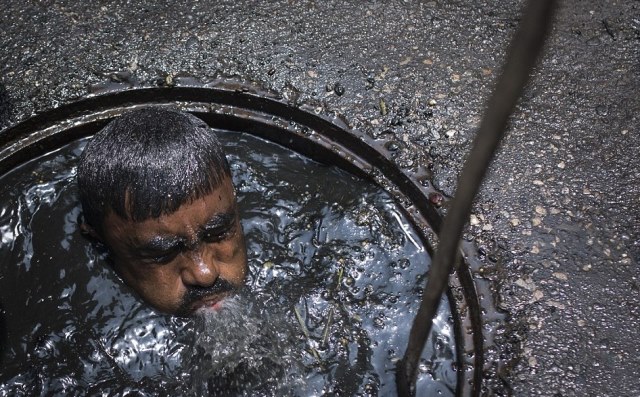In the week under review, Tata Trusts, the clutch of philanthropic and community development bodies of the Tata Group dating back to 1892, launched what they called the #TwoBinsLifeWins campaign to draw public attention to one of India’s darkest secrets under its underbelly — the life and times of the sewer worker.
The film, conceptualised by FCB Ulka, shows a child very poignantly narrating the story of his father through a poem titled “My father runs the country”. What follows is the moving story of a man who segregates waste in sewers in the underbelly of the city that never sleeps.
Tata Trusts, through its social initiative, Mission Garima, aims to “promote safe, healthy, and humane working conditions” for sewer workers in Mumbai.
Divyang Waghela, who heads Tata Water Mission, Tata Trusts, said: “Conservancy workers are the backbone of large metropolitan cities like Mumbai. They help in keeping our city clean, and in order. It is imperative that efforts are made to ensure their safety, and to protect their dignity. Tata Trusts launched ‘Mission Garima’ to bring about a significant positive impact in the work environment of conservancy workers. With #TwoBinsLifeWins, we hope to prod the conscience of the nation and encourage citizens to segregate waste at their respective homes, so conservancy workers live a life of dignity and respect.”
Keegan Pinto, who is National Creative Director, FCB Ulka, added: “The inspiration for this heartfelt film comes from true feelings, testimonials, and insights. This film is very special to us. But the film is not more important than the cause. Nothing is more heinous, ridiculous, tragic, disgusting and a greater product of our trademark Indian collective convenience and ignorance than a man having to go down in the drain and then, dying too early leaving his children orphaned. We really wish the film makes a difference and we hope people start segregating their waste at home with the small act of two bins and abolish this practice altogether.”
According to estimates, there are over 200,000 Indians — most of them traditionally belonging to lower castes — employed in such sanitation work, who the government calls “manual scavengers”— a remarkable euphemism for a someone who holds down the most gruesome job in the world. In India, it is estimated that only a third of all urban households are linked to a piped sewer system. Most astonishingly, close to 80% of sewage from Indian cities goes untreated!
There have been efforts to end the profession of “manual scavenging” for decades. In 2014, India’s Supreme Court ordered the abolition of manual scavenging, calling it a “denigrating task”.


Researchers have established that manual scavenging workers are exposed to potently harmful gases, such as methane and ammonia, while also contracting serious bacterial infections. According to government estimates, nearly 600 sewer workers have died in sewers across the country since 1993 (until 2019). After 11 manual scavengers died during the course of a single week in September 2019, protesters mobilised themselves in New Delhi, chanting and holding banners that read: “Stop killing us”.
However, official rulings seemed to have had little effect. “Till today, to the people who are cleaning, in their life, there is no change,” says Bezwada Wilson, National Convener of the Safai Karamchari Andolan (“Sanitation Workers’ Movement”), a Delhi-based organisation that has been mobilising people against manual scavenging.
According to a 2011 Housing Census, India has over 2.6 million “insanitary” latrines that require human excreta to be handled manually from open drains, where the waste is discharged before it decomposes.
CREDITS:
Client: Tata Trust
Creative Agency: FCB Ulka
Creative Team: Keegan Pinto, Donavan D’souza, Rajdatta Ranade, Giamaria Fernandes, Adamya Mod, Sanjana Dora, Shambhabi Raha, Wiless D’mello, Niraj Patil, Aabhaas Worah and Siddharth Ubale
Agency Producers: Alpa Jobalia, Stanley Christen
Production House: Basta
Film Director: Divyansh Ganjoo
DOP: Keyur Dekate
Producer: Mahima Sharma







